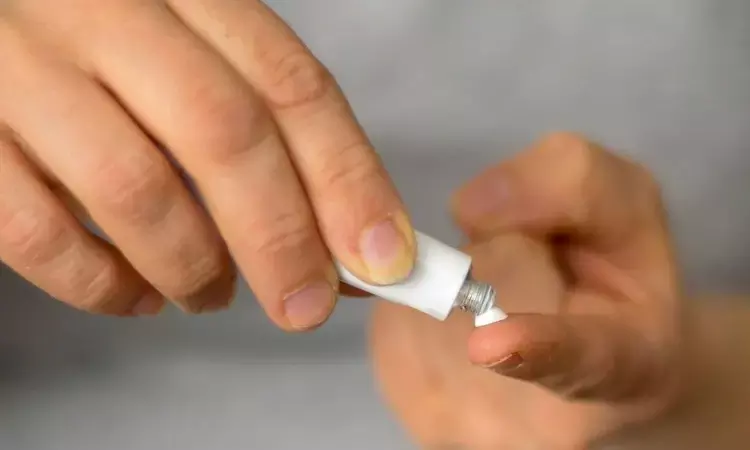- Home
- Medical news & Guidelines
- Anesthesiology
- Cardiology and CTVS
- Critical Care
- Dentistry
- Dermatology
- Diabetes and Endocrinology
- ENT
- Gastroenterology
- Medicine
- Nephrology
- Neurology
- Obstretics-Gynaecology
- Oncology
- Ophthalmology
- Orthopaedics
- Pediatrics-Neonatology
- Psychiatry
- Pulmonology
- Radiology
- Surgery
- Urology
- Laboratory Medicine
- Diet
- Nursing
- Paramedical
- Physiotherapy
- Health news
- Fact Check
- Bone Health Fact Check
- Brain Health Fact Check
- Cancer Related Fact Check
- Child Care Fact Check
- Dental and oral health fact check
- Diabetes and metabolic health fact check
- Diet and Nutrition Fact Check
- Eye and ENT Care Fact Check
- Fitness fact check
- Gut health fact check
- Heart health fact check
- Kidney health fact check
- Medical education fact check
- Men's health fact check
- Respiratory fact check
- Skin and hair care fact check
- Vaccine and Immunization fact check
- Women's health fact check
- AYUSH
- State News
- Andaman and Nicobar Islands
- Andhra Pradesh
- Arunachal Pradesh
- Assam
- Bihar
- Chandigarh
- Chattisgarh
- Dadra and Nagar Haveli
- Daman and Diu
- Delhi
- Goa
- Gujarat
- Haryana
- Himachal Pradesh
- Jammu & Kashmir
- Jharkhand
- Karnataka
- Kerala
- Ladakh
- Lakshadweep
- Madhya Pradesh
- Maharashtra
- Manipur
- Meghalaya
- Mizoram
- Nagaland
- Odisha
- Puducherry
- Punjab
- Rajasthan
- Sikkim
- Tamil Nadu
- Telangana
- Tripura
- Uttar Pradesh
- Uttrakhand
- West Bengal
- Medical Education
- Industry
Topical tacrolimus are effective in treating oral lichen planus: Study

A new study conducted by S. Utz and colleagues showed that when topical corticosteroids are ineffective for treating oral lichen planus (OLP), tacrolimus might be used as a second-line treatment. The findings of this study were published in the Journal of the European Academy of Dermatology and Venereology.
Oral lichen planus has been successfully treated with topical tacrolimus. Long-term consequences and the best application procedure with progressive lowering have not yet been investigated. With a focus on the ideal long-term therapy plan, this research evaluated the clinical response of OLP to tacrolimus in routine clinical practice.
All OLP patients who received topical tacrolimus (0.03% oral rinse) treatment in a clinical environment between 2015 and 2020 were retrospectively analyzed for this study. A 4-point scale (full remission, significant remission, partial remission, and no reaction) was used to assess the objective clinical response, while a 3-point scale was used to assess subjective impairment (severe, moderate and none).
The key findings of this study were as follows:
1. There were 57 patients total. 56 patients (98%) have previously had therapy with topical steroids.
2. After tacrolimus was introduced, 28%, 62%, 87%, and 97% of patients, respectively, obtained objective remission after 3, 6, 12, and 24 months. After 3, 6, and 12 months of therapy, respectively, 16%, 48%, 69%, and 83% of patients reported subjective remission.
3. After 3, 6, 12, and 24 months, the treatment frequency could gradually decrease from twice daily to once daily or less in 28%, 61%, 78%, and 87% of patients, respectively.
4. 41% of patients temporarily discontinued therapy, but 67% of them relapsed after a median of 3.3 months.
5. During the time of observation, four individuals (7%) had the development of squamous cell carcinoma (SCC).
6. Other than that, there weren't many very mild side effects.
In conclusion, during the maintenance phase, the frequency of therapy can frequently be decreased. Therapy should be guided by both objective impairment and clinical activity indicators. It's important to follow up often to detect potential SCC.
Reference:
Utz, S., Suter, V. G. A., Cazzaniga, S., Borradori, L., & Feldmeyer, L. (2022). Outcome and long‐term treatment protocol for topical tacrolimus in oral lichen planus. In Journal of the European Academy of Dermatology and Venereology. Wiley. https://doi.org/10.1111/jdv.18457
Neuroscience Masters graduate
Jacinthlyn Sylvia, a Neuroscience Master's graduate from Chennai has worked extensively in deciphering the neurobiology of cognition and motor control in aging. She also has spread-out exposure to Neurosurgery from her Bachelor’s. She is currently involved in active Neuro-Oncology research. She is an upcoming neuroscientist with a fiery passion for writing. Her news cover at Medical Dialogues feature recent discoveries and updates from the healthcare and biomedical research fields. She can be reached at editorial@medicaldialogues.in
Dr Kamal Kant Kohli-MBBS, DTCD- a chest specialist with more than 30 years of practice and a flair for writing clinical articles, Dr Kamal Kant Kohli joined Medical Dialogues as a Chief Editor of Medical News. Besides writing articles, as an editor, he proofreads and verifies all the medical content published on Medical Dialogues including those coming from journals, studies,medical conferences,guidelines etc. Email: drkohli@medicaldialogues.in. Contact no. 011-43720751


